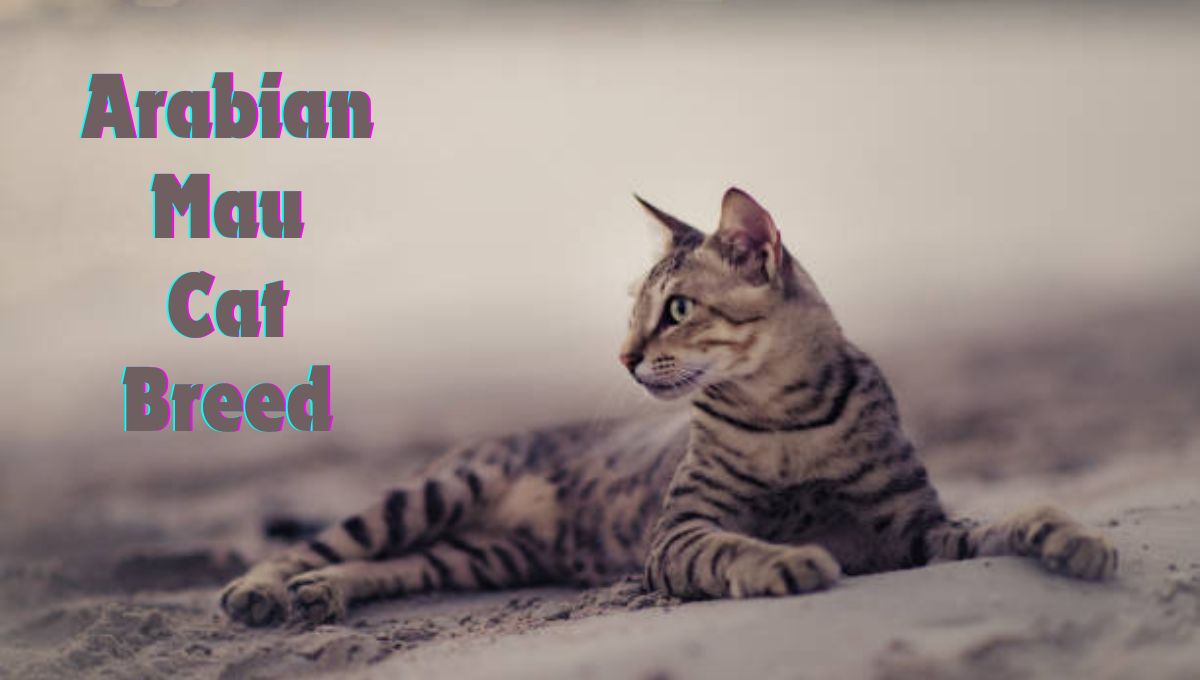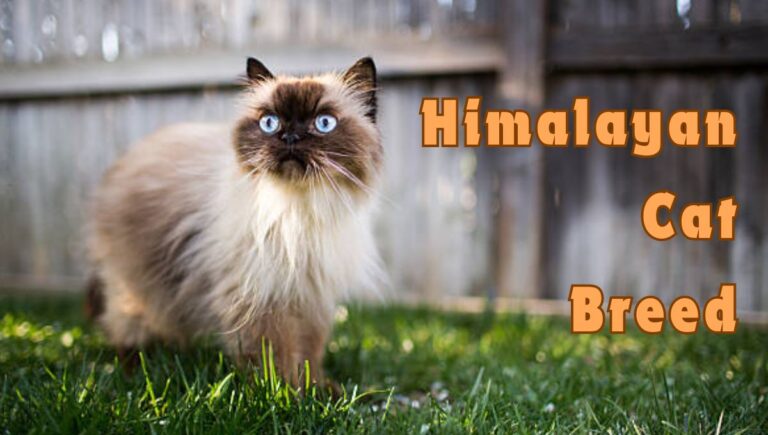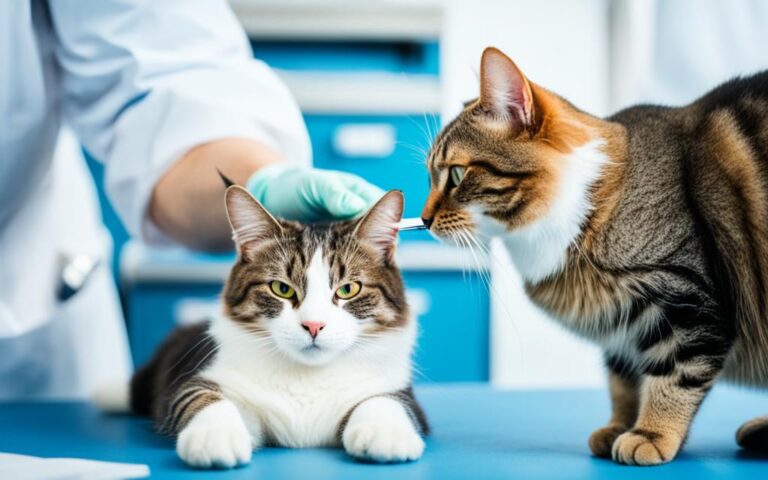Arabian Mau Cat Breed
The Arabian Mau is a domestic cat breed that hails from the Arabian Peninsula. Known for its natural elegance and resilience, this breed has adapted to the harsh desert climate over centuries. The name “Arabian Mau” is derived from its geographic origin and the traditional name “Mau,” which means “cat” in Egyptian. This breed is an ancient, natural breed that has thrived in the arid regions of the Arabian Peninsula, making it well-suited to both hot and cold environments.
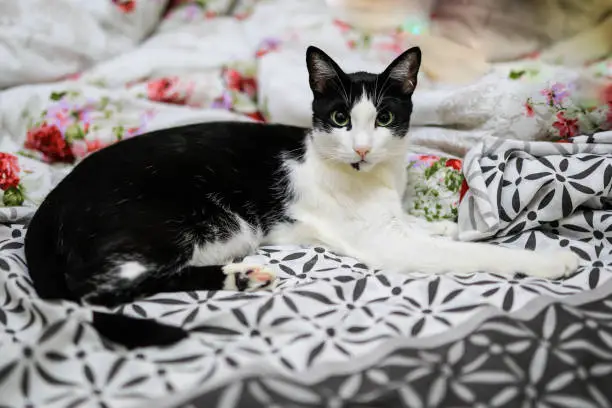
What sets the Arabian Mau apart from other breeds is its robust and athletic build, coupled with a sleek, short coat that comes in various colors and patterns, including white, black, brown, and tabby. Their almond-shaped eyes are expressive, often reflecting shades of green or yellow, which adds to their striking appearance. They have large ears, designed to dissipate heat, which is an adaptation to their desert origins. These cats are medium to large in size, with a muscular body and long legs that enhance their agility and hunting skills.
Beyond their physical attributes, Arabian Maus are known for their friendly and social nature. They are highly intelligent and curious, often engaging with their human companions and their environment in a playful and interactive manner. Despite their independent streak, they form strong bonds with their owners and are known to be affectionate and loyal. Their adaptability and resilience make them excellent pets for a variety of households, as they adjust well to both indoor and outdoor living. The Arabian Mau’s unique combination of history, physical prowess, and engaging personality makes it a truly distinctive breed.
Table of Contents
I. Origin and History of Arabian Mau Cat Breed :
Breed’s Origins and Historical Significance :
- The Arabian Mau is a breed that originates from the Arabian Peninsula, encompassing countries like the United Arab Emirates, Saudi Arabia, Oman, Qatar, and Kuwait.
- This breed is considered one of the oldest natural breeds, having evolved naturally in the desert environment of the Arabian Peninsula without human intervention.
- Its historical significance lies in its ability to adapt and thrive in the harsh desert climate, which has shaped its physical and behavioral traits over thousands of years.
Geographical Region of Origin :
- The Arabian Peninsula, characterized by its arid climate and vast desert landscapes, is the primary region where the Arabian Mau developed.
- This region’s extreme temperatures, scarcity of water, and open spaces influenced the breed’s development, resulting in a cat with exceptional survival skills, including an ability to hunt and fend for itself in a challenging environment.
Influence on Characteristics :
- The harsh conditions of the Arabian Peninsula have endowed the Arabian Mau with a number of distinctive characteristics:
- Physical Traits: The breed has a muscular and athletic build, large ears for heat dissipation, and a short coat that comes in various colors, aiding in camouflage and temperature regulation.
- Behavioral Traits: Arabian Maus are known for their resilience, intelligence, and independence, traits that were necessary for survival in the wild.
- Adaptability: Their ability to thrive both as street cats and in domestic settings speaks to their versatility and robust nature.
Folklore and Legends :
- Folklore and local legends often celebrate the Arabian Mau as a symbol of agility and survival. Stories tell of these cats being companions to Bedouins, who valued their hunting prowess and companionship in the desert.
- Some tales suggest that the Arabian Mau’s keen senses and hunting abilities were gifts from ancient desert gods, enhancing their mystique and cultural significance in the region.
The Arabian Mau’s deep-rooted history in the Arabian Peninsula has not only defined its unique characteristics but also its esteemed place in local culture and folklore. This natural evolution and adaptation continue to make the Arabian Mau a fascinating and beloved breed both in its homeland and around the world.
II. Physical Characteristic of Arabian Mau Cats :
| Height | Medium to large-sized, with a height range typically between 12 to 14 inches at the shoulder. |
| Weight | Males usually weigh between 10 to 16 pounds, while females tend to be slightly lighter, ranging from 8 to 12 pounds. |
| Life Span | Arabian Maus are generally healthy and have a life expectancy of 12 to 15 years. |
| Good With | These cats are known to be good with children, other cats, and even dogs, making them suitable for families and multi-pet households. |
| Temperament | Arabian Maus are friendly, social, and affectionate. They are known for their playful and curious nature, as well as their strong bond with their human companions. |
| Intelligence | Highly intelligent and quick learners. They enjoy interactive play and mental stimulation. |
| Shedding Amount | Low to moderate. Their short coats shed minimally compared to long-haired breeds. |
| Grooming | Requires minimal grooming. Regular brushing once a week is usually sufficient to keep their coat healthy and reduce shedding. |
| Exercise Needs | High exercise needs due to their active and athletic nature. They require plenty of playtime and physical activity to stay happy and healthy. |
| Energy Level | High energy levels. Arabian Maus are lively and enjoy exploring their surroundings, climbing, and engaging in interactive play. |
| Meowing Level | Moderate. They are vocal and expressive but not overly talkative compared to some other breeds. |
| Drool amount | Very low. Arabian Maus are not known to drool excessively. |
| Coat Length/Texture | Short coat that is smooth and close to the body. This coat type helps them stay cool in hot climates. |
| Colors | The breed comes in various colors, including white, black, brown, and shades of gray. |
| Patterns | Common patterns include solid, tabby, and bicolor. The variety in patterns adds to the breed’s visual appeal. |
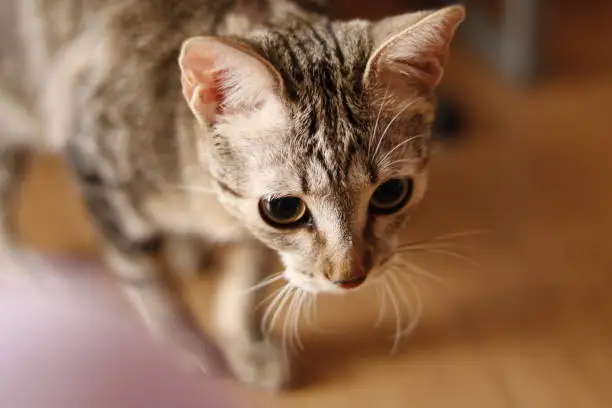
Detailed Physical Characteristic of the Arabian Mau Cat Breed :
Size :
- Males: Typically weigh between 10 to 16 pounds and stand about 12 to 14 inches tall at the shoulder.
- Females: Slightly lighter, generally weighing between 8 to 12 pounds, with a height similar to males, around 12 to 14 inches.
Coat Type and Color Variations :
- Coat Texture and Length: The Arabian Mau has a short coat that is smooth and close to the body. This coat type is well-suited for the hot desert climate of their origin.
- Color Variations: The breed exhibits a wide range of colors, including:
- White
- Black
- Brown
- Gray
- Common Color Patterns: Patterns are varied and include:
- Solid: Single-color coats, which can be striking in their simplicity.
- Tabby: Striped or swirled patterns, often in combination with another color.
- Bicolor: Two distinct colors, typically with one being white and the other a contrasting shade.
Distinctive Features :
- Ear Shape: Arabian Maus have large, pointed ears that are designed to dissipate heat. This is a distinctive feature that helps them stay cool in the hot desert environment. Their ears are also set slightly to the sides, giving them an alert and attentive appearance.
- Tail Characteristics: The tail is of medium length and is typically well-proportioned to the body. It is neither too thick nor too thin, tapering to a rounded tip. The tail often features the same color patterns as the body, adding to their overall balanced look.
- Unique Physical Traits:
- Eye Shape and Color: The eyes of an Arabian Mau are almond-shaped, contributing to their expressive and captivating gaze. Eye colors commonly range from green to yellow, depending on the coat color.
- Body Build: They have a robust, muscular build with long legs, which enhance their agility and speed. This athletic physique is a result of their natural evolution in the wild.
- Adaptability: Their physical resilience and adaptable nature are standout traits. They are known for their ability to thrive in various environments, from the deserts of the Arabian Peninsula to urban and suburban homes worldwide.
The combination of their striking physical features, diverse color patterns, and natural adaptations makes the Arabian Mau a truly unique and distinctive breed.
III. Temperament and Personality of Arabian Mau Cats :
Typical Temperament and Personality Traits :
The Arabian Mau is known for its friendly, social, and affectionate nature. These cats tend to form strong bonds with their human companions, displaying a loyal and loving demeanor. They are highly sociable and often enjoy the company of both humans and other animals, making them excellent family pets. Their playful and curious nature keeps them actively engaged with their surroundings, providing endless entertainment for their owners.
General Demeanor :
Arabian Maus are typically outgoing and confident. They are not overly shy or reserved and often approach new situations and people with curiosity and ease. Their sociability extends to other pets, including dogs and other cats, making them versatile companions in multi-pet households. They thrive on interaction and enjoy being involved in family activities, often following their owners around and engaging in playful antics.
Common Behavioral Traits :
Positive Traits :
- Intelligence: Arabian Maus are highly intelligent and quick learners. They enjoy interactive toys and puzzles that challenge their minds.
- Playfulness: They have a high energy level and love to play, whether it’s with toys, other pets, or their human companions. This playful nature keeps them active and entertained.
- Affectionate: They are known for their affectionate nature, often seeking out cuddles and attention from their owners. They enjoy sitting on laps and being petted.
Challenging Traits :
- Independence: While they are affectionate, Arabian Maus also have an independent streak. They may sometimes prefer to explore on their own or find a quiet spot to rest.
- Vocalization: They can be moderately vocal, expressing themselves through various meows and chirps. While not overly talkative, they do communicate their needs and desires vocally.
- High Energy: Their high energy levels require ample playtime and stimulation. Without sufficient activity, they might become bored and potentially engage in undesirable behaviors like scratching furniture or excessive vocalizing.
Managing and Addressing Breed Specific Behavioral Issues :
- Providing Mental and Physical Stimulation: To manage their high energy and intelligence, it’s essential to provide plenty of interactive toys, climbing structures, and opportunities for play. Regular play sessions can help burn off excess energy and prevent boredom.
- Social Interaction: Ensure they have plenty of social interaction, both with humans and other pets. This can help prevent feelings of loneliness and keep them mentally stimulated.
- Training and Enrichment: Engage in regular training sessions to stimulate their minds and reinforce positive behaviors. Puzzle toys and feeding puzzles can provide additional mental enrichment.
- Scratch Posts and Climbing Trees: Providing scratch posts and climbing trees can help satisfy their natural scratching and climbing instincts, protecting furniture and other household items.
By understanding and accommodating their unique temperament and personality traits, owners can create a fulfilling and harmonious environment for their Arabian Mau. Their combination of affection, intelligence, and playful energy makes them delightful companions, provided their needs for stimulation and interaction are met.
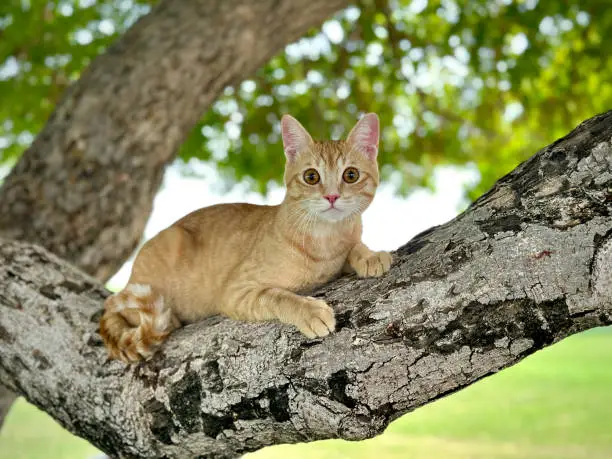
IV. Care and Maintenance of Arabian Mau Cat Breed :
Grooming Needs :
- Brushing: Despite their short coat, brushing once a week helps remove loose hair and reduce shedding.
- Ear and Eye Care: Check and clean their ears regularly to prevent infections. Wipe their eyes with a damp cloth to remove any discharge.
- Nail Trimming: Trim their nails every few weeks to prevent overgrowth and reduce the risk of scratches.
- Bathing: Bathing is rarely necessary due to their short coat. If needed, use a mild cat shampoo and ensure they are thoroughly dried afterwards.
Health Consideration :
- Regular Vet Visits: Schedule annual veterinary check-ups to monitor their health and address any potential issues early.
- Vaccinations and Parasite Control: Keep vaccinations up-to-date and maintain a regular schedule for flea, tick, and worm prevention.
- Dental Care: Provide dental chews and regular tooth brushing to prevent dental diseases.
- Monitor for Common Issues: Be aware of common health issues in cats, such as obesity, dental disease, and urinary tract issues, and seek veterinary advice if any symptoms arise.
Nutrition :
- Balanced Diet: Feed a high-quality, balanced diet appropriate for their age, weight, and activity level. Look for foods that contain a high protein content and essential nutrients.
- Regular Feeding Schedule: Maintain a consistent feeding schedule, typically two meals a day, to keep their metabolism stable.
- Fresh Water: Ensure fresh, clean water is always available. Consider using a cat water fountain to encourage hydration.
- Avoid Overfeeding: Monitor their weight and avoid overfeeding, as obesity can lead to health issues. Use portion control and avoid excessive treats.
Exercise :
- Daily Activity: Ensure they receive ample daily exercise through interactive play, toys, and climbing structures.
- Interactive Play: Use toys like feather wands, laser pointers, and puzzle feeders to engage their hunting instincts and keep them mentally stimulated.
- Space to Explore: Provide a safe, enclosed outdoor area or plenty of indoor space with vertical climbing options to satisfy their curiosity and need for exploration.
By following these care and maintenance guidelines, owners can ensure their Arabian Mau remains healthy, happy, and well-adjusted. Their natural resilience and low-maintenance grooming needs make them relatively easy to care for, provided their exercise, nutritional, and health requirements are met.
V. Suitability of Arabian Mau Cats :
Compatibility with Children and Other Animals :
Interactions with Kids :
- Friendly and Sociable: Arabian Maus are known for their friendly and sociable nature, making them great companions for children. They are playful and enjoy interactive games, which can be very engaging for kids.
- Gentle and Patient: Generally, they are patient and gentle, tolerating the sometimes erratic behavior of young children well. However, it’s important to teach children how to interact respectfully with cats to prevent any stress or discomfort for the animal.
Tolerance for Other Pets :
- Good with Other Cats: Arabian Maus typically get along well with other cats, enjoying social interactions and play.
- Dog-Friendly: They are also known to be tolerant of dogs, especially if introduced properly and gradually. Their confident and curious nature helps them adapt to living with dogs.
- Other Pets: While generally adaptable, their interactions with smaller pets (like birds or rodents) should be supervised, as their natural hunting instincts could be triggered.
Special Considerations for Multi-Pet Households :
Introducing to Existing Pets :
- Gradual Introduction: Introduce the Arabian Mau to existing pets slowly. Start with scent swapping (exchanging bedding or toys) to familiarize them with each other’s scent before any face-to-face meetings.
- Controlled Meetings: Initial interactions should be controlled and supervised. Use barriers like baby gates or pet carriers to allow them to see and smell each other without direct contact.
- Positive Reinforcement: Reward both the Arabian Mau and the existing pets with treats and praise during interactions to create positive associations.
Managing Multi-Pet Dynamics :
- Separate Spaces: Provide separate spaces and resources (litter boxes, feeding areas, resting spots) for each pet to prevent territorial disputes.
- Monitor Interactions: Watch for any signs of stress or aggression and intervene if necessary. Gradually increase the amount of time they spend together as they become more comfortable.
Environmental Needs :
Space Requirements :
- Indoor Space: Arabian Maus do well in both small apartments and larger homes as long as they have plenty of vertical space to climb and explore. Cat trees, shelves, and perches are ideal.
- Outdoor Access: If possible, a safe, enclosed outdoor area can provide additional enrichment and exercise opportunities. However, they can thrive perfectly well as indoor cats if their environment is stimulating.
Special Environment Considerations :
- Temperature Tolerance: They are well-adapted to warmer climates due to their origins in the Arabian Peninsula. However, they can also adjust to cooler temperatures as long as they have warm, cozy places to rest.
- Enrichment: Provide a stimulating environment with plenty of toys, scratching posts, and climbing structures. Interactive play is essential to keep their minds and bodies active.
Settling into Home Environment :
- Gradual Acclimation: Allow them time to acclimate to their new home environment gradually. Provide a quiet, secure space initially where they can retreat if they feel overwhelmed.
- Routine and Consistency: Establish a consistent routine for feeding, playtime, and interaction to help them feel secure and settled.
In summary, the Arabian Mau is well-suited for families with children and other pets, given their friendly, sociable, and adaptable nature. With proper introductions and environmental enrichment, they can thrive in a variety of home settings, making them a versatile and rewarding addition to many households.
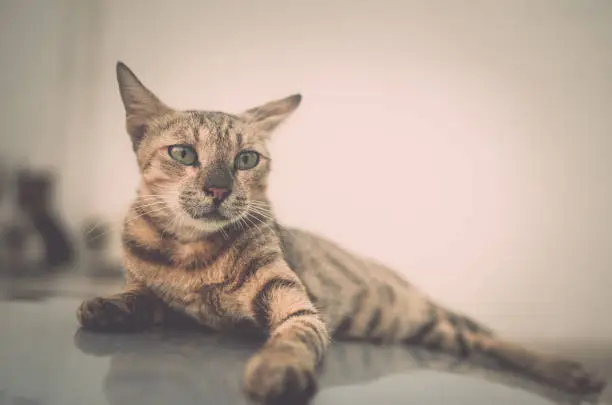
VI. Adoption and Breeder Consideration of Arabian Mau Cat Breed :
Encouragement for Adoption from Shelters or Rescue Organizations :
Adopting a cat from a shelter or rescue organization is a compassionate and rewarding choice. Many cats, including Arabian Maus, end up in shelters due to various circumstances and are in need of loving homes. By adopting, you provide a second chance to a cat in need and help reduce the number of animals in shelters. Adoption often saves lives, and it can be a fulfilling experience knowing you’ve given a cat a better life. Additionally, many shelter cats are already spayed or neutered, vaccinated, and sometimes even microchipped, reducing the initial costs for the adopter.
Guidance on Selecting a Reputable Breeder :
If you decide to purchase a purebred Arabian Mau, it’s crucial to select a reputable breeder to ensure the health and well-being of your new pet. Here are some guidelines:
- Research and Referrals: Start by researching breeders who specialize in Arabian Maus. Seek recommendations from veterinarians, cat fancier associations, and other cat owners.
- Visit the Breeder: Visit the breeder’s facility to ensure it is clean and the cats are well-cared for. Reputable breeders should be transparent and willing to show you where the cats are raised.
- Health Screenings: Ensure the breeder conducts health screenings for common genetic conditions and provides health certificates for the kittens. Ask about vaccinations, deworming, and any other health measures taken.
- Ethical Practices: Choose a breeder who prioritizes the health and temperament of their cats over profit. Ethical breeders will not have a constant supply of kittens but will breed responsibly and ensure proper care and socialization of the cats.
Cost Consideration and Potential Adoption Fees :
Adoption Costs :
- Shelters and Rescues: Adoption fees for cats from shelters or rescue organizations can range from $50 to $200. This fee often includes vaccinations, spaying/neutering, and a basic health check.
- Benefits: Adopting from a shelter is generally more cost-effective, as the initial medical expenses are often covered by the adoption fee. Some shelters also offer follow-up support and resources for new pet owners.
Purchasing Costs :
- Breeders: Purchasing a purebred Arabian Mau from a breeder can be significantly more expensive, typically ranging from $500 to $1,500, depending on the breeder’s reputation, the cat’s lineage, and other factors.
- Additional Expenses: Beyond the purchase price, consider additional costs such as vaccinations, spaying/neutering (if not already done), microchipping, and initial health check-ups. High-quality breeders usually cover these costs, but it’s essential to confirm.
Financial Aspects of Cat Ownership :
- Ongoing Costs: Regardless of whether you adopt or purchase, owning a cat includes ongoing expenses such as food, litter, toys, grooming supplies, and regular veterinary care. Annual costs can range from $500 to $1,000 or more, depending on the cat’s health and needs.
- Insurance: Pet insurance is an optional cost that can help manage unexpected veterinary expenses. Premiums vary based on coverage and the cat’s age and health but typically range from $10 to $30 per month.
Adopting an Arabian Mau from a shelter or rescue organization can be a fulfilling and cost-effective choice that provides a cat with a loving home. If purchasing from a breeder, ensure you select a reputable and ethical one who prioritizes the health and well-being of their cats. Consider the initial and ongoing costs associated with cat ownership to ensure you’re prepared for the financial commitment.
VII. Conclusion
The Arabian Mau cat breed is a remarkable and ancient breed originating from the Arabian Peninsula. Known for its natural elegance, resilience, and adaptability, the Arabian Mau is a medium to large-sized cat with a muscular build, large ears, and a short, sleek coat that comes in various colors and patterns. These cats are highly intelligent, playful, and affectionate, making them excellent companions for families with children and other pets. Their social nature and curiosity drive them to engage actively with their environment and human companions.
Proper care and responsible ownership are crucial for ensuring the well-being of an Arabian Mau. This includes providing adequate exercise through interactive play and mental stimulation, maintaining a balanced diet, and ensuring regular veterinary care to monitor health and prevent issues. Grooming needs are minimal, but regular brushing and nail trimming are necessary. Their high energy levels and curiosity require a stimulating environment with plenty of toys and climbing structures.
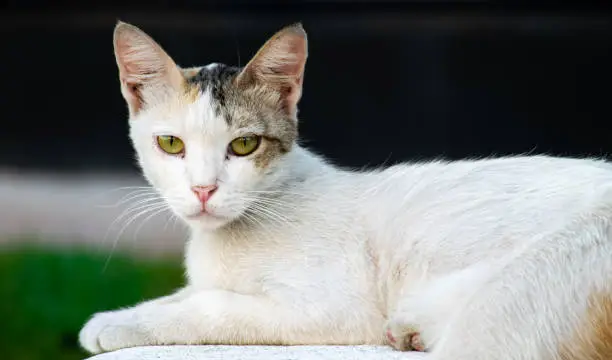
Before bringing an Arabian Mau into your home, it’s important to consider all aspects of cat ownership. Whether adopting from a shelter or purchasing from a reputable breeder, prospective owners should be prepared for the financial and time commitments involved in caring for this breed. Ensuring a loving and supportive environment will help an Arabian Mau thrive and become a cherished member of the family. Responsible ownership includes not only meeting their physical needs but also providing the social interaction and mental engagement essential for their happiness and health.
FAQ about Arabian Mau Cat Breed :
What is the origin of the Arabian Mau cat breed?
The Arabian Mau originates from the Arabian Peninsula, including countries like the United Arab Emirates, Saudi Arabia, Oman, Qatar, and Kuwait. It is one of the oldest natural breeds, having evolved in the desert environment over thousands of years.
How well do Arabian Maus get along with children and other pets?
Arabian Maus generally get along well with children and other pets, including cats and dogs. They are social and adaptable, making them good companions in multi-pet households. Proper introduction and socialization are important for harmonious relationships.
What type of environment is suitable for an Arabian Mau?
Arabian Maus are adaptable and can thrive in various environments, from small apartments to larger homes. They benefit from having plenty of vertical space to climb and explore. While they can adapt to different temperatures, they are well-suited for warmer climates due to their desert origins.
What are the costs associated with owning an Arabian Mau?
Adoption fees from shelters or rescue organizations typically range from $50 to $200, often covering vaccinations, spaying/neutering, and basic health checks. Purchasing from a breeder can cost between $500 to $1,500. Ongoing costs include food, litter, toys, grooming supplies, and veterinary care, ranging from $500 to $1,000 or more annually.
Is the Arabian Mau a good choice for first-time cat owners?
Yes, the Arabian Mau can be a good choice for first-time cat owners due to their friendly and adaptable nature. Their minimal grooming needs and robust health make them relatively low-maintenance, provided their exercise and social interaction needs are met.

